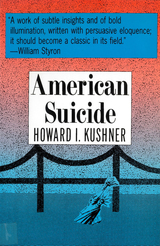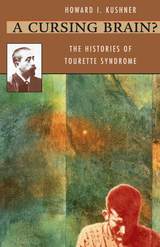
By the 1890s, however, the consensus about the causes of suicide became unglued as a bacteriological medicine and the rise of the social sciences jointly served to call into question eclectic diagnoses. The renewed doctrine of specific causation of disease quickly spilled over into a constellation of explanataions for social behavior. The rise of specialization, which followed the bacteriological revolution of the 1880s, made the moral treatment appear scientifically suspect.
The goal of American Suicide is to demonstrate how the apparent contradictions among sociological, psychoanalytic, and neurobiological explanations of the etiology of suicide may be resolved. Only througha reintegration of culture, psychology, and biology can we begin to construct a satisfactory answer to the questions first raised by Durkheim, Freud, and Kraepelin.

Over a century and a half ago, a French physician reported the bizarre behavior of a young aristocratic woman who would suddenly, without warning, erupt in a startling fit of obscene shouts and curses. The image of the afflicted Marquise de Dampierre echoes through the decades as the emblematic example of an illness that today represents one of the fastest-growing diagnoses in North America. Tourette syndrome is a set of behaviors, including recurrent ticcing and involuntary shouting (sometimes cursing) as well as obsessive-compulsive actions. The fascinating history of this syndrome reveals how cultural and medical assumptions have determined and radically altered its characterization and treatment from the early nineteenth century to the present.
A Cursing Brain? traces the problematic classification of Tourette syndrome through three distinct but overlapping stories: that of the claims of medical knowledge, that of patients' experiences, and that of cultural expectations and assumptions. Earlier researchers asserted that the bizarre ticcing and impromptu vocalizations were psychological--resulting from sustained bad habits or lack of self-control. Today, patients exhibiting these behaviors are seen as suffering from a neurological disease and generally are treated with drug therapy. Although current clinical research indicates that Tourette's is an organic disorder, this pioneering history of the syndrome reminds us to be skeptical of medical orthodoxies so that we may stay open to fresh understandings and more effective interventions.
READERS
Browse our collection.
PUBLISHERS
See BiblioVault's publisher services.
STUDENT SERVICES
Files for college accessibility offices.
UChicago Accessibility Resources
home | accessibility | search | about | contact us
BiblioVault ® 2001 - 2024
The University of Chicago Press









